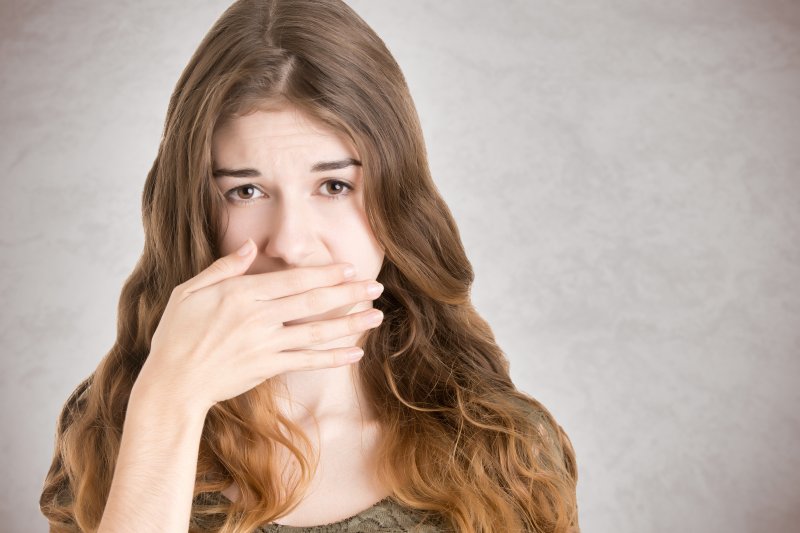
Halitosis, also known as bad breath, is a common symptom of poor oral hygiene and several other causes including tobacco use, infections, and dry mouth. This condition is more common than you may think. Approximately 80 million Americans suffer from chronic halitosis and 90% of it originates from the mouth and airway passages. Fortunately, with a better oral hygiene routine among other lifestyle changes can help to freshen breath and prevent halitosis. Read on to learn more about this condition and the reason behind it.
What Causes Halitosis to Occur?
Bad breath is usually caused by bacteria that is present on your teeth, gums, and tongue. Halitosis can often be associated with one of the following causes:
- Poor oral hygiene: If you aren’t brushing or flossing as much as you should be, food particles remain in your mouth are a colorless, stick film of bacteria known as plaque forms on your teeth. If you aren’t cleaning this away, it can cause issues for both your teeth and gums. Eventually you could develop cavities and periodontal disease.
- Dry mouth: Saliva helps to wash away food particles and bacteria that cause bad odors, so when the mouth is lacking saliva, it becomes the perfect breeding ground for bacteria. This is often the cause of “morning breath” because dry mouth naturally occurs while you sleep.
- Infections: If you have an infection in your mouth, such as periodontitis, this results in additional bacteria in the mouth and foul odors.
- Smoking: Using tobacco products contributes to halitosis by drying out the mouth, increasing the risk of gum disease, and leaving behind a smell that lingers even after you brush your teeth.
- Medical conditions: In some cases, bad breath is caused by certain medications or medical conditions elsewhere in the body. These include sinus issues, gastric reflux, diabetes, and liver and kidney disease.
What Symptoms Are Associated with Bad Breath?
Halitosis often is accompanied by other related symptoms that affect the mouth. Here are some of the most common:
- Dry mouth
- Sores in the mouth
- Gum tenderness
- Mouth or facial pain
- Sore throat
- Swollen, red gums
- Bleeding gums
- Gum recession
- Swollen tonsils
How Can Bad Breath Be Prevented?
Fortunately, you don’t need to put up with bad breath. Here are a few ways you can stop it in its tracks:
- Brush and floss: By brushing twice and flossing once daily, you can get rid of the bad breath causing bacteria.
- Mouthwash: As a temporary fix, mouthwash can help to kill bacteria and mask foul smells.
- Stay hydrated: By drinking plenty of water, you can wash away food debris and prevent additional bacterial growth.
- Stimulate saliva flow: You can do this by chewing sugar-free gum or eating high fiber fruits and veggies like carrots and apples.
- Stop smoking: Dropping this harmful habit will help to keep your breath fresh.
- See your dentist: Make regular appointments to see your dentist. They will be able to detect early signs of gum disease, tooth decay, and other issues.
If you have halitosis as a result of poor oral hygiene or another issue, there are steps you can take to reduce it. You will have fresh breath again in no time.
About the Author
Dr. Arindam Kakkar graduated from the NYU College of Dentistry and was elected to membership into the dental honor society, the OMICRON KAPPA UPSILON. He has spent hundreds of hours on continuing education in order to stay up to date with modern dental innovations. If you are struggling with bad breath, Dr. Kakkar would be happy to help you out. For more information or to schedule an appointment, visit his website or call (908) 850-0005.
